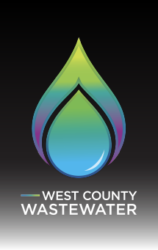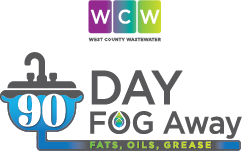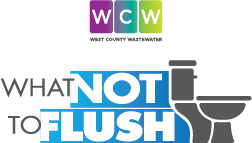
SEWER OVERFLOWS
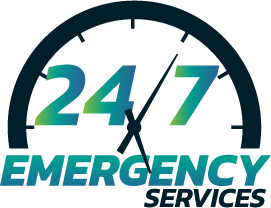
SEWER EMERGENCY? Call (510) 222-6700, option 1.
Sanitary sewer overflows can contaminate and damage homes and businesses, as well as threaten public health and the environment. West County Wastewater responds to sewer emergencies within our service area 24 hours a day, seven days a week. This often means responding to overflows in the community and evaluating clogged pipes and blockages at homes and businesses.
When a sewer backup or other issue occurs, WCW will inspect the situation at no charge and determine if the problem is in the sewer lateral or the public main. If a problem is found in the public main, WCW will fix the issue as soon as possible.
Did WCW recently respond to an emergency near you? We want to hear about your experience. Please fill out the emergency response customer service survey.
Sewer backups or blockages in the private sewer lateral, building sewer or internal plumbing are the responsibility of the property owner. Property owners are advised to resolve the issue as soon as possible with a licensed plumber. Any work done outside the building requires a WCW sewer permit.
HOW DOES WEST COUNTY WASTEWATER RESPOND IN AN EMERGENCY?
Do you know what to do if you see something like this?

If you notice an overflow, call (510) 222-6700, option 1, immediately.
Sewage spills are costly and hazardous. They can impact neighborhood parks and streets. Overflows often end up in rivers, lakes, streams, creeks and oceans, leading to beach closures.
A quick response can mean the difference between a cleanup of 100 gallons of sewage versus 10,000 gallons!
OVERFLOW PREVENTION
Sanitary sewer overflows occur when sewer pipes are blocked or restricted, causing wastewater to back up in the pipe and flow out through manholes or other outlets.
Overflows into homes, businesses and streets can result in property damage, bad-smelling odors and thousands of dollars in damage. They threaten public health and the environment.
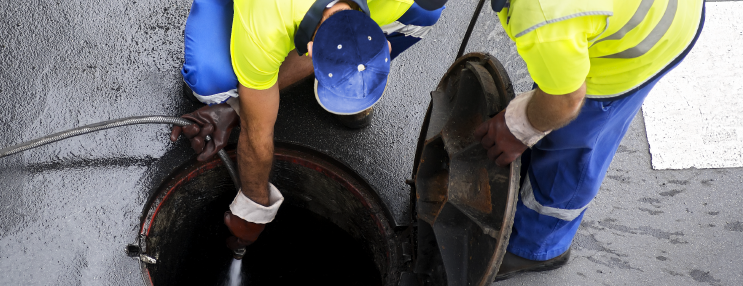
Sewer lines can become blocked due to roots, FOG (fats, oils, and grease) buildup, or debris and other items in the pipes, including wipes. When this occurs, wastewater is stopped by the blockage and then backs up toward the first possible outlet. Most of the time this is a manhole. However, sometimes the outlet is a fixture or drain in a customer’s home or business. Broken or damaged sewer laterals and excessive groundwater entering the sewer during a storm can also cause sanitary sewer overflows.
Customers can help prevent sewage overflows by keeping plumbing and sewer laterals properly maintained, ensuring the property has a backwater overflow device installed, and keeping FOG and wipes out of the pipes.
LEADING CAUSES OF OVERFLOWS
FOG (fats, oils and grease) and wipes are among the leading causes of sewer system backups. Many people are unaware of the costly and hazardous effect wipes and FOG can have on the sewage system.

How can I help keep the sewage system function properly?
FATS, OILS, & GREASE (FOG)
FOG thickens and other waste clings to it, clogging pipes and jamming pumps. To keep FOG from building up in your pipes, follow these tips:

1
Pour FOG into a covered, disposable container and throw it into your garbage. Never put FOG down sinks, drains or toilets.
2
Soak up remaining oils and grease with an absorbent material such as paper towels and dispose of it in your green waste bin or garbage.
3
Before you wash dishes, scrape food scraps and FOG into the compost, green waste or garbage bin.
4
Use sink strainers to catch any remaining food waste while washing dishes. Empty it into the compost, green waste or garbage bin.
Note: Small quantities of FOG are safe for green waste and compost, but large amounts should be thrown in the trash.
Remember, when in doubt, throw it out!
WIPES CLOG PIPES
Only toilet paper should be flushed down the toilet! Wipes and other items, such as floss, paper towels and hygiene products, do not readily break down and can clog pipes, jam pumps and obstruct treatment systems. Even items that are labeled as flushable can lead to blockages that can flood homes, businesses or streets. Remember to keep your wipes out of the pipes!
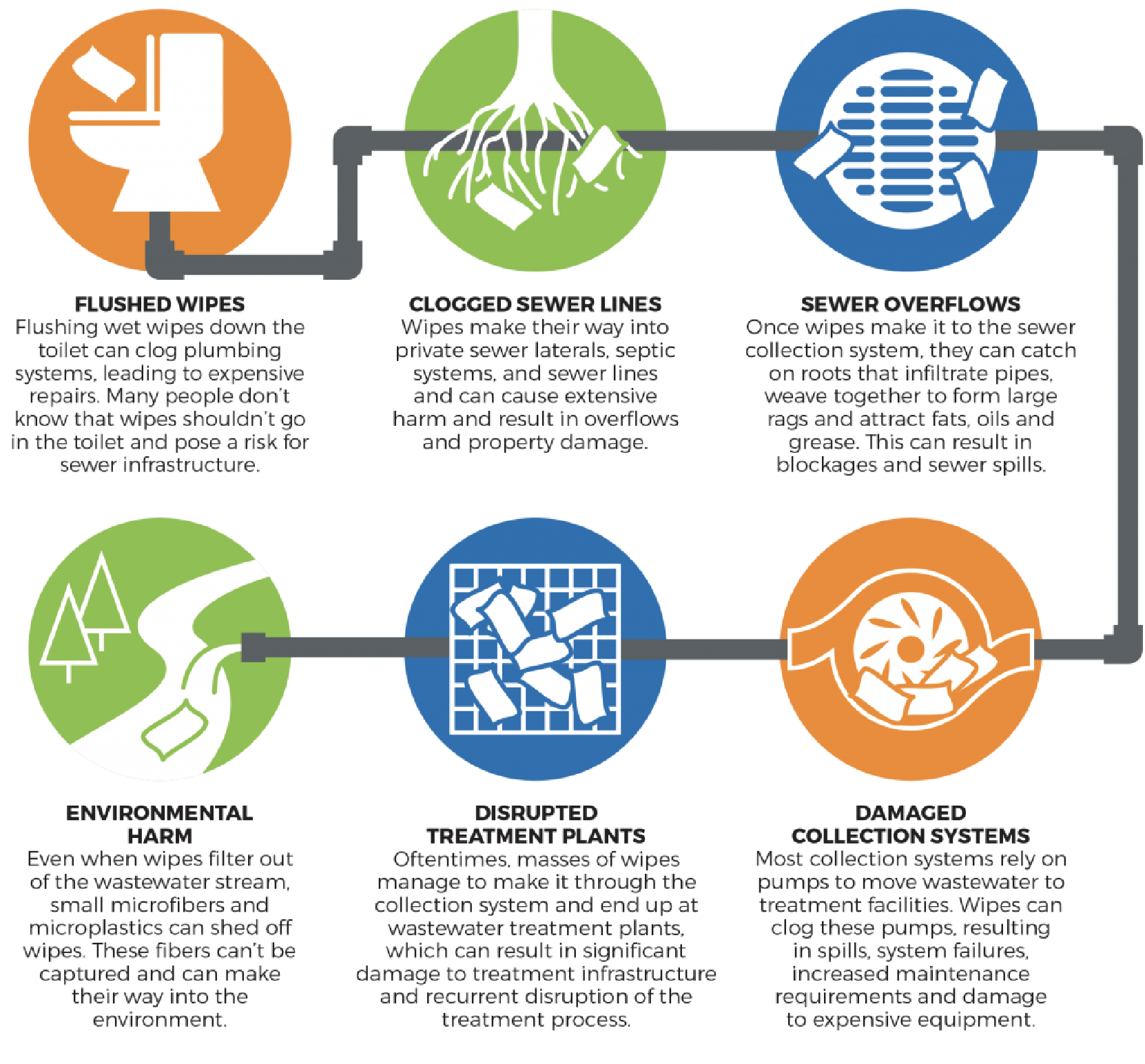
Infographic courtesy of California Association of Sanitation Agencies.
BACKWATER OVERFLOW DEVICES
THERE ARE TWO TYPES:
|
Mushroom backwater overflow device |
Popper backwater overflow device |
Backwater overflow devices are plumbing fixtures that are effective at preventing sanitary sewer overflows into homes. They use a float/seal mechanism that automatically opens if water begins to back up. This allows the overflow to occur outside the home. To ensure the device can function properly, make sure it is not blocked or covered by landscaping.
Backwater overflow devices are required on all new houses and must be installed whenever a lateral/side sewer is repaired or replaced. They are available in a variety of models and price ranges. These devices can be installed by a licensed plumbing contractor or the homeowner.
After installation, an inspection by WCW and a Certificate of Compliance is required. If a new cleanout is necessary, a WCW sewer permit is required.
WCW recommends all homes install a backwater overflow device. To find out if a property already has one, check the exterior of the home or, for assistance, call WCW at (510) 222-6700.
EMERGENCY RESPONSE CUSTOMER SERVICE SURVEY
West County Wastewater (WCW) is a publicly owned utility responsible for operating and maintaining public sanitary sewer mains in your area. WCW provides 24-hour emergency service within its boundaries when there is a problem with the public sanitary sewer system. If you recently used this service, please fill out the feedback form below. Your comments and suggestions for improvement are encouraged and welcomed. Your feedback will be used to improve the quality of service in the future.
Ratings – Please select your rating using the following:
A = Outstanding, B = Above Average, C = Average, D = Below Average, F = Unacceptable
If preferred, you may phone or fax comments or questions to:
CSO Supervisor
Phone: (510) 222-6700
Fax: (510) 222-3277
Thank you for your feedback!
